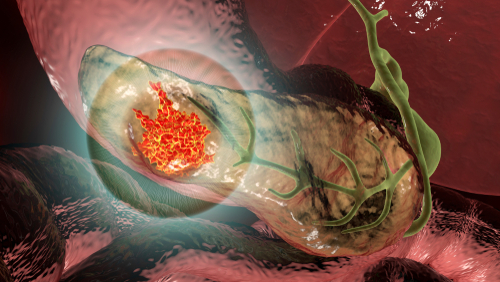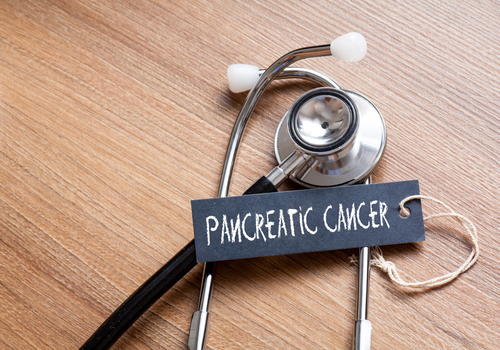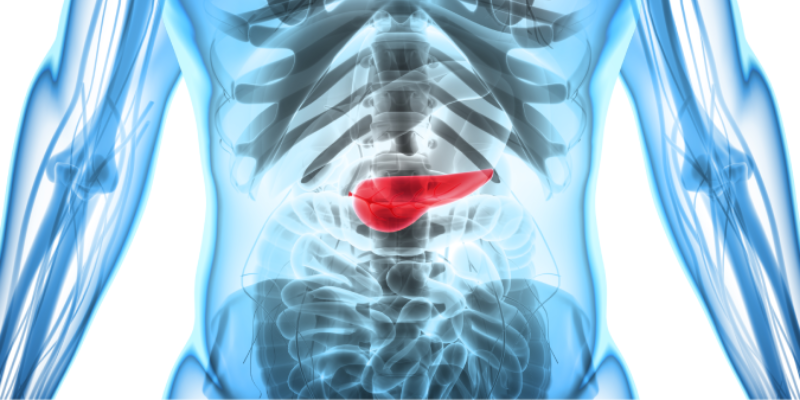
While fluorouracil, leucovorin, irinotecan, and oxaliplatin (FOLFIRINOX) has been shown to improve overall survival (OS) rates in patients with resectable pancreatic ductal adenocarcinoma, the current standard of care is upfront surgical resection followed by 6 months of FOLFIRINOX.
The phase 2 Nordic Pancreatic Cancer Trial (NORPACT)-1 began in 2016 to compare the safety and efficacy of FOLFIRINOX with upfront surgical resection to determine if the treatment can be successfully administered in the neoadjuvant setting.
The multicenter, randomized trial was conducted in 12 hospitals across northern Europe. A total of 140 patients were recruited and assigned to receive treatment between February 2017 and April 2021. Each patient had a World Health Organization performance status of 0 or 1 and a resectable tumor of the pancreas that was radiologically strongly suspected to be pancreatic adenocarcinoma.
Patients were randomly assigned to receive neoadjuvant FOLFIRINOX or upfront surgery. Patients placed in the FOLFIRINOX group were administered 4 neoadjuvant cycles of the treatment comprising oxaliplatin 85 mg/m2, irinotecan 180 mg/m2, leucovorin 400 mg/m2, and fluorouracil 400 mg/m2 bolus, then 2400 mg/m2 over 46 hours on day 1 of each 14-day cycle. The treatment cycle was followed by surgery and adjuvant chemotherapy.
In the upfront surgery group, patients received adjuvant chemotherapy after undergoing surgery. Adjuvant chemotherapy initially consisted of gemcitabine plus capecitabine (gemcitabine 1000 mg/m2 administered over 30 minutes on days 1, 8, and 15 of each 28-day cycle and capecitabine 830 mg/m2 administered twice daily for 3 weeks with 1 week of rest in each 28-day cycle). The FOLFIRINOX group received 4 cycles, while the upfront surgery group received 6.
The chemotherapy drugs were subsequently changed to permit use of adjuvant modified FOLFIRINOX consisting of oxaliplatin 85 mg/m2, irinotecan 150 mg/m2, leucovorin 400 mg/m2, and fluorouracil 2400 mg/m2 administered over 46 hours on day 1 of each 14-day cycle for 8 cycles in the neoadjuvant FOLFIRINOX group and 12 cycles in the upfront surgery group.
A total of 77 patients were placed in the FOLFIRINOX group, while the surgery group included 63. The study’s primary end point was OS at 18 months. For the per-protocol analysis, 17 (22%) patients in the FOLFIRINOX group were excluded, as 10 did not receive neoadjuvant therapy, 4 did not have pancreatic ductal adenocarcinoma, and 3 received a different neoadjuvant regimen. In the upfront surgery group, 8 (13%) patients were excluded, as 7 did not have pancreatic ductal adenocarcinoma and 1 did not undergo surgical exploration.
In the FOLFIRINOX group, 61 (79%) patients received neoadjuvant therapy. At 18.0 months, 60% of patients in this group were alive, and the median OS rate was 25.1 months. In the surgery group, 73% of patients remained alive at 18.0 months, with a median OS rate of 38.5 months.
At the per-protocol analysis, 57% of patients remained alive at 18 months in the FOLFIRINOX group, and the median OS rate was 23 months. In the surgery group, 70% of patients remained alive at 18.0 months, and the median OS rate was 34.4 months.
In the safety population, 42 (58%) of 73 patients in the FOLFIRINOX group and 19 (40%) of 47 in the surgery group experienced at least 1 grade 3 or worse adverse event (AE). Resection occurred in 63 (82%) of 77 patients in the FOLFIRINOX group and in 56 (89%) of 63 in the surgery group. One sudden death of unknown cause and 1 COVID-19-related death occurred after the first cycle of neoadjuvant FOLFIRINOX.
Adjuvant chemotherapy was administered to 51 (86%) of 59 patients in the FOLFIRINOX group and 44 (90%) of 49 in the surgery group. Adjuvant FOLFIRINOX was administered to 13 (25%) patients in the FOLFRINOX group and 19 (43%) in the surgery group. The most common grade 3 or higher AE that occurred during neoadjuvant chemotherapy was neutropenia in 22% of patients in the FOLFIRINOX group and 11% of those in the surgery group.
A survival benefit was not seen in patients who received neoadjuvant FOLFIRINOX over upfront surgery, and implementing the treatment during the study was challenging. Future trials for resectable pancreatic ductal adenocarcinoma should be driven by patient biomarkers.







 © 2025 Mashup Media, LLC, a Formedics Property. All Rights Reserved.
© 2025 Mashup Media, LLC, a Formedics Property. All Rights Reserved.